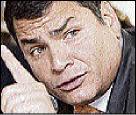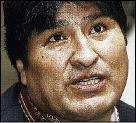Jorge Heine, Contributor

Heine
On September 28, Ecuador approved, by a comfortable majority, a new Constitution. Over the past decade five new constitutions have seen the light in the Andean region - the broad arc that goes from Venezuela to Colombia and Ecuador all the way down the Pacific coast to Peru, and then into Bolivia. This is a big victory for President Rafael Correa, a United States-trained economist, who made the proposal of a new Constitu-tion a key item of his election plank.
President Evo Morales of Bolivia is facing opposition to his own new Constitution in the low-land, Eastern provinces like Santa Cruz, and President Hugo Chavez of Venezuela suffered a defeat in the referendum on reforms to his own Constitution in December 2007.
Why is this happening in the Andes, rather than, say, in the Southern Cone or Central America? Quite apart from a long tradition of weak 'stateness', over the past three decades these countries have had difficulties in adapting to a changing global environment, unable to find a suitable niche for their exports - except for their most prized one, illegal drugs.
Poorest and hardest hit
Bolivia and Ecuador are the poorest and hardest hit, despite their valiant efforts at economic reform and to apply the 'Washington Consensus' to the letter and beyond. Ecuador went so far as to adopt in 2000 the US dollar as its national currency, with the predictable inflationary effect.
Bolivia and Ecuador have also been highly unstable - since 1995 Ecuador has had eight presidents, and Bolivia nine. The notion that a key problem in these countries is excessive concentration of power in the executive branch, or that the new constitutions would somehow exacerbate such an existing problem, is oxymoronic. These are countries in which the very fact of a president finishing his or her term in office is a major achievement.
As Samuel P. Huntington put it 40 years ago in his classic Political Order in Changing Societies, "There is a failure to recognise that most such countries are suffering from the absence of power in their political systems. The problem is not to seize power but to make power, to mobilise groups into politics and to organism their participation in politics."
And this is precisely what presidents like Rafael Correa and Evo Morales are doing. It so happens that their countries are two with the highest share of Amerindian populations in the region (Morales himself, a native Aymara, is the first Amerindian to be elected president in the Western Hemisphere), and one reason for the instability and lack of development of Bolivia and Ecuador has been the long-standing exclusion of that part of the population.
In 2005, Morales became the first Bolivian president to be elected with a majority of the vote in many decades - candidates elected with 22 per cent or 25 per cent of the vote had become the norm, leading to weak, short-lived governments. Correa, on the other hand, who came in second with a mere 26 per cent of the vote in the October 2006 elections, to everybody's surprise defeated Ecuador's richest man, Alvaro Noboa, in the second round.
Won vast majorities


Correa and Morales
He has since won vast majorities in four national elections, and enjoys approval ratings of 60 to 70 per cent. This is unheard of in Ecuador, a fragmented polity known more for its fissiparous tendencies and divisions than for its sense of national identity.
The peculiar notion that in countries such as Ecuador the creation of a set of constitutional rules to allow a government to actually govern, to allow the president to have some degree of influence on the legislative agenda, and to stabilise the game of musical chairs played by the in-today-out-tomorrow predecessors of Correa, would be somehow undemocratic is, to put it mildly, odd.
As Huntington put it in another context, "These statements seem to imply that power is something 'flying around on the floor of the capitol or the presidential palace'." Before dividing power (between the presidency and the Congress, between the central government and the provinces) in developing societies such as these, power has to be created in the first place.
Most powerful head of state
A recurrent argument against Correa's new Constitution is that it makes him the most powerful head of state Ecuador has ever had. If done through the ballot box and fully respecting civil liberties, as Correa has, is this a bad thing, particularly considering the weakness of his predecessors? Is the fact that it would allow him to run for two additional four-year terms such an unmitigated disaster? In North American and Western Europe, as well as in the Commonwealth Caribbean, heads of government often rule for eight, 10 or 12 years, providing policy continuity. Yet, if this happens in Latin America, it is immediately denounced as undemocratic.
Ecuador is a fascinating case because of the weakness President Correa started from in 2006 - a young leader with little government experience (a short stint as finance minister), no parliamentarians (he made it a point not to run candidates for Congress, being bent on producing a new Constitution, and his sights was set on a Constitutional Assembly), no traditional party support, and in charge of a country with limited oil and gas reserves.
Yet, in a scant two years, he played that weak hand so deftly that he now has a new, custom-made Constitution, high approval ratings and a respected international standing.
The real test, of course, will come now, and we shall see whether he is able to deploy this new constitutional framework into policies that will lift the Ecuadorean economy from the doldrums in which it finds itself, despite the high price of oil. Having written his doctoral dissertation at the University of Illinois on the impact of globalisation on Latin America, President Correa should know which levers to pull. But there is little doubt that Ecuador is today already a very different country from what it was in 2006.
Jorge Heine holds the Chair in Global Governance at the Balsillie School of International Affairs and is a Distinguished Fellow at the Centre for International Governance Innovation in Waterloo, Ontario. He serves currently as vice-president of the International Political Science Association. Feedback may be sent to columns@gleanerjm.com.

